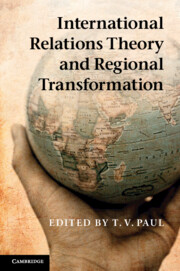Book contents
- Frontmatter
- Contents
- Figures and tables
- About the contributors
- Acknowledgments
- Part 1 Introduction
- Part 2 Realist perspectives
- Part 3 Liberal perspectives
- 5 Economic interdependence and regional peace
- 6 Regional organizations àla carte
- 7 Transforming regional security through liberal reforms
- Part 4 Constructivist perspectives
- Part 5 Eclectic perspectives
- Part 6 Conclusions
- Index
- References
5 - Economic interdependence and regional peace
Published online by Cambridge University Press: 05 June 2012
- Frontmatter
- Contents
- Figures and tables
- About the contributors
- Acknowledgments
- Part 1 Introduction
- Part 2 Realist perspectives
- Part 3 Liberal perspectives
- 5 Economic interdependence and regional peace
- 6 Regional organizations àla carte
- 7 Transforming regional security through liberal reforms
- Part 4 Constructivist perspectives
- Part 5 Eclectic perspectives
- Part 6 Conclusions
- Index
- References
Summary
Any serious treatment of how regions become more cooperative and peaceful must consider the commercial-liberal thesis. The thesis asserts that economic links among states alter those states’ incentives and hence their actions and interactions. National economies may be linked in various ways, including trade in goods and services, investment, borrowing and lending, and guest workers. The welfare of one state may come to depend to some extent upon links with another; when two states depend on each other – when bilateral trade, for example is so high that its disruption would harm both states – the relationship is one of interdependence. The commercial-liberal claim is that economic interdependence pacifies relations among states. With some refinement, discussed below, the claim should be applicable not just to pairs of states but also to regions as T. V. Paul defines them in this volume – that is, as “clusters of states that are proximate to each other and are interconnected in spatial, cultural, and ideational terms in a significant and distinguishable manner.”
The interdependence thesis is widely held, intuitive (to some), and empirically supported. It also is relevant as never before, as economic barriers among states around the world are so low that we speak of an era of “globalization.” Surely, many say, at least one cause of the extraordinary peace in Europe since 1945 is the tight economic ties between the economies of member states: the ongoing free movement of goods, capital, and labor, and more recently the single currency most members use, the harmonization of product regulation and labor standards, and so on. Surely, at least most of these would add, this sort of economic integration is one of the keys to a peaceful future in East Asia. Surely the Middle East would be more peaceful and cooperative if its national economies likewise became more integrated – if Israel, Saudi Arabia, Iran, and so forth, traded and invested extensively in one another.
- Type
- Chapter
- Information
- International Relations Theory and Regional Transformation , pp. 107 - 132Publisher: Cambridge University PressPrint publication year: 2012
References
- 8
- Cited by



